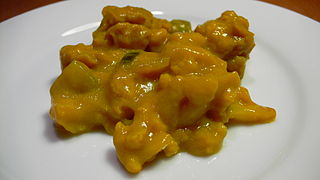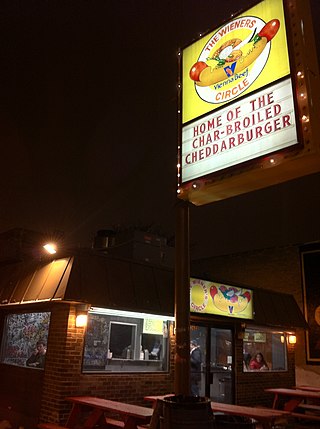
A hot dog is a dish consisting of a grilled, steamed, or boiled sausage served in the slit of a partially sliced bun. The term hot dog can refer to the sausage itself. The sausage used is a wiener or a frankfurter. The names of these sausages commonly refer to their assembled dish. Hot dog preparation and condiments vary worldwide. Common condiments include mustard, ketchup, relish, onions in tomato sauce, and cheese sauce. Other toppings include sauerkraut, diced onions, jalapeños, chili, grated cheese, coleslaw, bacon and olives. Hot dog variants include the corn dog and pigs in a blanket. The hot dog's cultural traditions include the Nathan's Hot Dog Eating Contest and the Oscar Mayer Wienermobile.

A corn dog is a wiener on a stick that has been coated in a thick layer of cornmeal batter and deep fried. It originated in the United States and is commonly found in American cuisine.

Piccalilli, or mustard pickle, is a British interpretation of South Asian pickles, a relish of chopped and pickled vegetables and spices. Regional recipes vary considerably.

A Chicago-style hot dog, Chicago Dog, or Chicago Red Hot is an all-beef frankfurter on a poppy seed bun, originating from the city of Chicago, Illinois. The hot dog is topped with yellow mustard, chopped white onions, bright green sweet pickle relish, a dill pickle spear, tomato slices or wedges, pickled sport peppers, and a dash of celery salt. The complete assembly of a Chicago hot dog is said to be "dragged through the garden" due to the many toppings. The method for cooking the hot dog itself varies depending on the vendor's preference. Most often they are steamed, water-simmered, or less often grilled over charcoal.

Superdawg is a drive-in hot dog stand with carhop service. It is located in the Norwood Park neighborhood of Chicago, at the intersection of Milwaukee, Devon, and Nagle Avenues. Superdawg has the distinction of being one of the few original drive-in restaurants left in the United States. Its methods have been the same since it opened in 1948. A second, similar location on Milwaukee Avenue in Wheeling, Illinois opened in 2010.

A Maxwell Street Polish consists of a grilled or fried length of Polish sausage topped with grilled onions and yellow mustard and optional pickled whole, green sport peppers, served on a bun. The sandwich traces its origins to Chicago's Maxwell Street market, and has been called one of "the classic foods synonymous with Chicago".

Portillo's Restaurant Group, Inc. is an American fast casual restaurant chain based in the Chicago area that specializes in serving Chicago-style food such as hot dogs, Maxwell Street Polish, and Italian beef. The company was founded by Dick Portillo on April 9, 1963, in Villa Park, Illinois, under the name "The Dog House".

Vienna Beef Inc. is the main manufacturer of the hot dog used in the classic Chicago-style hot dog, as well as Polish sausage and Italian beef, delicacies of independent Chicago-style hot dog and beef stands. The company also produces a variety of deli meats, some of which are available at Chicago area supermarkets.

Different areas of the world have local variations on the hot dog, in the type of meat used, the condiments added, and its means of preparation.
Pink's Hot Dogs is a landmark hot dog restaurant in the Fairfax District of the city of Los Angeles. It is on North La Brea Avenue, across the street from the Hollywood district on the east.

Papaya King is a fast food restaurant on the Upper East Side of Manhattan in New York City.

Hot Doug's was a Chicago, Illinois-based restaurant specializing in a variety of hot dogs and sausages. The self-proclaimed "Sausage Superstore and Encased Meat Emporium" was in its second location at 3324 North California Avenue in the city's Avondale neighborhood before it closed on October 3, 2014. Its first location, on Roscoe Street, closed after a 2004 fire. Hot Doug's was frequently featured in local and national media for its unique menu, and its purveyor and head chef, Doug Sohn, has been noted for his work to create affordable gourmet food. The restaurant was an extremely popular dining destination among both locals and tourists, and at lunch time and throughout much of the weekend customers could expect to wait in lines sometimes exceeding 4 hours just to get in the door.

A hot dog cart is a specialized mobile food stand for preparing and selling street food, specifically hot dogs, to passersby. In some jurisdictions, a cart operator must meet stringent health regulations designed to protect the public. Hot dog carts are quick and easy food services, supplying millions of people with food every day. In 2015 the U.S. Hot Dog Council estimated that 15% of the approximately 10 billion hot dogs consumed by Americans in 2014 were purchased from a mobile hot dog vendor cart. Hot dog carts are very common in New York City, and most of the hot dogs purveyed by hot dog carts in New York City are sourced from Sabrett.

The Wieners Circle is a hot dog stand on Clark Street in the Lincoln Park neighborhood of Chicago, Illinois, United States. It is known for its Maxwell Street Polish, Char-dogs, hamburgers, cheese fries, and the mutual verbal abuse between the employees and the customers during the late-weekend hours.

Gene's & Jude's is a popular and iconic hot dog stand in River Grove, Illinois, founded in 1946 by Chicago city worker Gene Mormino. The stand is famous for its limited approach to the Chicago-style hot dog, its toppings departing from tradition by including only mustard, onions, relish, sport peppers and fresh cut French fries placed on top, known as a Depression Dog. The menu is limited to hot dogs, double dogs, tamales and fries, and lacks any trace of ketchup even for dipping the fries.

A Seattle-style hot dog, locally referred to as a Seattle Dog, is a hot dog served in a bun slathered with cream cheese. In Seattle the dogs are sold from food carts, especially outside stadiums on game day and as a late-night meal outside the city's music venues.

Art's Famous Chili Dogs is a hot dog stand located in Los Angeles, California. It was founded in 1939 by Art Elkind a frankfurter entrepreneur, who was its owner until 1990. It is well known for its chili dogs, which have been praised by a variety of Los Angeleno media outlets, and proclaimed by aficionados as the finest in the city.

Chicago-style relish is a type of sweet pickle relish typically used on Chicago-style hot dogs. The unique color of the relish, often referred to as "neon green", is created by adding blue dye to regular pickle relish. The first use of Chicago-style relish on a hot dog has been attributed to several different restaurants, including Fluky's and Superdawg.


















